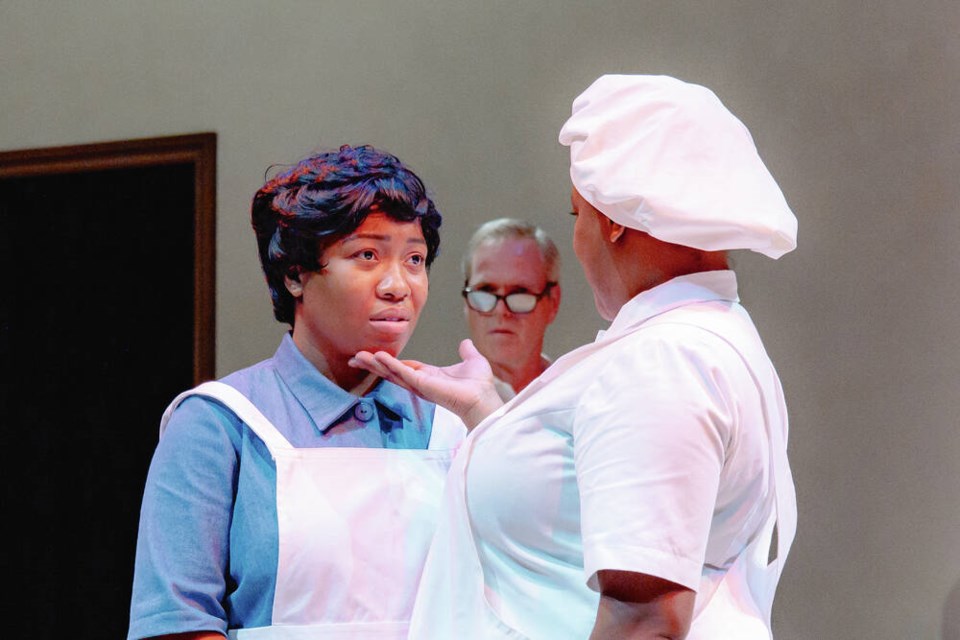Remember that episode of The Crown when Elizabeth and Phillip visit Kenya in 1952? King George VI dies while they’re away, leaving young Liz to become Queen of England at the ripe old age of 25.
My main reaction was that Nairobi seemed an awfully nice place to sightsee, especially if you were rich and royal. The response of Toronto playwright Marcia Johnson was quite different.
Jamaica-born Johnson was unhappy with the short shrift black people received in the episode. Being a theatre artist, she did more than complain — she wrote a play.
Serving Elizabeth — which premièred in Kamloops last year and played the Stratford Festival — just opened at the Belfry Theatre. The 2 1/2-hour play pivots back and forth between Elizabeth’s royal visit to Kenya and the contemporary experiences of a young Kenyan-Canadian woman working as an intern on a Crown-like TV series in London.
Rather than serving as backdrops for royal shenanigans, black characters take centre stage here. The results are fresh and intriguing. Serving Elizabeth is on the longish side and once or twice dips into preachiness. Yet ultimately Johnson wins us over with her warmth, humour and compassion — cleverly giving voice to a people overlooked in The Crown.
Serving Elizabeth is an “answer play.” The phenomenon is common enough in pop music — for instance, Lynyrd Skynyrd came out with Sweet Home Alabama in response to Neil Young’s Southern Man. It happens in theatre, too. David Henry Hwang’s 2007 play Yellow Face is a response to the controversy that surrounded the casting of a white actor for an Asian role in Miss Saigon.
In the main, by its very nature, art that responds to other art tends to be lesser. Happily, Serving Elizabeth’s originality and intelligence — and the validity of the points it makes — adds up to a play that stands on its own.
The play begins in 1950s Kenya. Mercy (Lucinda Davis) is a restaurant owner renowned for her culinary excellence. Her skills are such that she attracts the notice of Talbot (Ryan Hollyman), a royal emissary. Elizabeth and Phillip want to sample traditional dishes on their visit — it’s up to button-down Talbot to arrange this.
The problem is, Mercy is a fierce anti-colonialist (don’t forget the bloody Mau Mau rebellion against settlers raged throughout the ’50s). Her reluctance to whip up goodies for British oppressors is countered by daughter Faith (Sia Foryoh), who points out it’s a highly lucrative gig. Mercy reluctantly caves, resulting in such amusing scenes as Talbot tutoring mother and daughter on comportment (how to curtsy, etc.).
Serving Elizabeth flip-flops between this narrative and modern day London. Tia (Foryoh) is a Canadian film student who’s landed a job as an intern on a TV series that sounds suspiciously like The Crown. A fan of British royals, she’s mostly just thrilled to be there.
One day she shows her colleague Robin (Amanda Lisman, also playing Elisabeth with a perfect upper-crust accent) a cheesy rom-com script she’s written. Robin pooh-poohs it, and somehow Tia reconnects with her integrity. This change of heart results in her meeting with Maurice (Hollyman), the writer of the series, during which Tia castigates him for treating native Kenyans like colourful props. She suggests he alter his script and flesh out the black characters.
Maurice, almost apoplectic as he violently squirts bitters into his cocktail, is less than impressed: “You swan in and say change this and change that. Who do you think you are?”
Here Johnson asks the audience to suspend our belief to the max. Of course it’s satisfying to witness Tia give Maurice a righteous knock-out punch (take that you puffed-up cad!). Yet the scene seems improbable, at least as portrayed here. Ditto for a sequence in Kenya in which Mercy gives Liz a good dressing-down for being a ribbon-cutting colonialist oppressor. Elizabeth’s reaction is along the lines of “Thank you ma’am, may I have another?” This reaction, while admirable, seems about as likely as Jason Kenney offering a grovelling apology to Justin Trudeau for being mean to him.
Progressive politics and art can be uneasy bedfellows, as anyone familiar with George Bernard Shaw knows. It can be done. Death of a Salesman delivers a round-house blow to capitalism, yet Arthur Miller managed to accomplish this without Willy Loman reading the riot act to his boss.
On Thursday each member of the cast (including Nathan D. Simmons as love interest Montague/Steve) had strong moments. Serving Elizabeth relentlessly shifts between the 1950s and present day, so much so that one backdrop wall flips back and forth like a giant windshield wiper. Kudos goes to director Nigel Shawn Williams, who navigates these transitions elegantly, and the actors who manage quick costume changes with aplomb. Designer Itai Erdal’s lighting is both bold and beautiful.
Serving Elizabeth is an engaging night at the theatre. On the whole Johnson strikes a good balance between being entertaining and getting her points across. We get a powerful sense of her grace, big-heartedness, inventiveness and willingness to show multiple facets of issues that are complex and potentially volatile.
Added bonus: this production marks a strong return to in-person audiences for the Belfry Theatre after many months.

